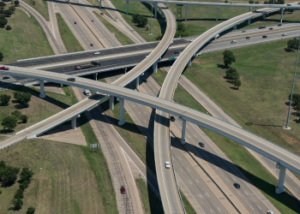Revolutionizing Transportation:
Unleashing the Power of Space-Based Data Analytics
In today’s dynamic world, the transportation industry faces a myriad of challenges that demand innovative solutions.
Fortunately, the convergence of space technology and big data analytics has paved the way for a transformative approach to address these challenges. By harnessing the vast potential of Earth observation satellites and the analytical power of big data, transportation professionals now have unprecedented opportunities to gain valuable insights and make data-driven decisions that have the potential to revolutionize the industry.
Optimizing Traffic Flow
 Urban areas grapple with the perpetual issue of traffic congestion, which hampers productivity and increases fuel consumption. Space-based data analytics presents an exceptional opportunity to monitor traffic patterns in real-time and identify bottlenecks through the integration of satellite imagery with intelligent transportation systems.
Urban areas grapple with the perpetual issue of traffic congestion, which hampers productivity and increases fuel consumption. Space-based data analytics presents an exceptional opportunity to monitor traffic patterns in real-time and identify bottlenecks through the integration of satellite imagery with intelligent transportation systems.
By analyzing the data, transportation professionals can gain insights into traffic flows, detect congestion hotspots, and devise dynamic traffic management strategies. This data-driven approach enables the implementation of optimal routing and coordination systems, ultimately reducing congestion, minimizing travel times, and improving overall transportation efficiency.
Infrastructure Planning and Maintenance
 The condition of transportation infrastructure, including roads, bridges, and railways, is critical to ensuring safety and operational efficiency. Space-based data analytics offers transportation professionals an invaluable tool for monitoring and evaluating infrastructure. By leveraging high-resolution satellite imagery, professionals can gain a comprehensive understanding of the condition and usage patterns of transportation assets.
The condition of transportation infrastructure, including roads, bridges, and railways, is critical to ensuring safety and operational efficiency. Space-based data analytics offers transportation professionals an invaluable tool for monitoring and evaluating infrastructure. By leveraging high-resolution satellite imagery, professionals can gain a comprehensive understanding of the condition and usage patterns of transportation assets.
This data-driven approach enables early detection of deterioration, facilitates proactive maintenance planning, and optimizes resource allocation. By addressing infrastructure needs in a timely manner, professionals can improve safety, minimize disruptions, and enhance overall transportation reliability.
Intelligent Fleet Management
 Effective fleet management is crucial for transportation companies seeking to optimize their operations. Space-based data analytics empowers professionals to track and analyze the movement and performance of vehicles in real-time. By integrating satellite data with transportation systems, professionals gain insights into vehicle locations, speeds, and fuel consumption.
Effective fleet management is crucial for transportation companies seeking to optimize their operations. Space-based data analytics empowers professionals to track and analyze the movement and performance of vehicles in real-time. By integrating satellite data with transportation systems, professionals gain insights into vehicle locations, speeds, and fuel consumption.
Armed with this information, they can make data-driven decisions to improve route planning, optimize fuel efficiency, and reduce carbon emissions. These intelligent fleet management practices lead to substantial cost savings, environmental sustainability, and enhanced customer satisfaction.
Predictive Analytics for Demand and Supply
 Anticipating and managing transportation demand and supply is a complex task. However, space-based data analytics offers professionals the means to develop predictive models that consider various factors, such as population growth, economic indicators, and event schedules.
Anticipating and managing transportation demand and supply is a complex task. However, space-based data analytics offers professionals the means to develop predictive models that consider various factors, such as population growth, economic indicators, and event schedules.
By incorporating satellite data into these models, professionals gain the ability to predict peak travel times, plan for capacity expansions, and optimize resource allocation. This data-driven approach enables proactive decision-making, ensuring that transportation systems meet future demands efficiently and effectively. By leveraging predictive analytics, professionals can improve service quality, enhance customer experience, and achieve operational excellence.
Mapping and Ride-Sharing Services
 Space-based data analytics has also revolutionized the mapping and ride-sharing landscape, transforming how individuals navigate and utilize transportation services.
Space-based data analytics has also revolutionized the mapping and ride-sharing landscape, transforming how individuals navigate and utilize transportation services.
Mapping applications like Google Maps and Apple Maps leverage satellite imagery to provide accurate and real-time navigation information, enabling users to find optimal routes, avoid traffic congestion, and reach their destinations efficiently. Moreover, ride-sharing platforms such as Uber have harnessed space-based data analytics to optimize their operations. By integrating satellite data with their algorithms, Uber and similar services can predict demand patterns, optimize driver assignments, and enhance the overall user experience.
This integration of space-based data analytics with mapping and ride-sharing services has brought unprecedented convenience and efficiency to personal transportation, further exemplifying the transformative power of space technology in shaping the future of transportation.
The Role of Professionals in Data-Driven Transportation:
The revolution in space-based data analytics presents exciting opportunities for transportation professionals to shape the future of the industry.
Data Scientists and Analysts
 Professionals proficient in data science, machine learning, and statistical analysis play a pivotal role in extracting valuable insights from satellite imagery. Through their expertise, they develop sophisticated algorithms, implement predictive models, and identify patterns to support evidence-based decision-making.
Professionals proficient in data science, machine learning, and statistical analysis play a pivotal role in extracting valuable insights from satellite imagery. Through their expertise, they develop sophisticated algorithms, implement predictive models, and identify patterns to support evidence-based decision-making.
By applying their skills to transportation data, these professionals enable stakeholders to optimize operations, enhance safety measures, and address emerging challenges with precision and foresight.
Urban Planners and Policy Makers
 Space-based data analytics provides urban planners and policy makers with an unprecedented understanding of transportation systems. By integrating satellite data into their planning processes, these professionals gain valuable insights into traffic flows, infrastructure needs, and future demands. Armed with this knowledge, they can design sustainable cities, optimize land use, and create efficient transportation networks. By making informed decisions based on space-based data analytics, urban planners and policy makers can improve mobility, reduce congestion, and enhance the overall quality of life for citizens.
Space-based data analytics provides urban planners and policy makers with an unprecedented understanding of transportation systems. By integrating satellite data into their planning processes, these professionals gain valuable insights into traffic flows, infrastructure needs, and future demands. Armed with this knowledge, they can design sustainable cities, optimize land use, and create efficient transportation networks. By making informed decisions based on space-based data analytics, urban planners and policy makers can improve mobility, reduce congestion, and enhance the overall quality of life for citizens.
By leveraging satellite imagery, urban planners and policy makers gain a comprehensive understanding of transportation dynamics, allowing them to implement targeted interventions and develop policies that foster sustainable, efficient, and accessible transportation systems.
Technology Innovators
 The fusion of space technology and transportation opens doors for innovative solutions. Professionals specializing in remote sensing, geospatial analysis, and data visualization are at the forefront of developing advanced tools and applications that leverage space-based data analytics. These cutting-edge technologies enable transportation professionals to extract actionable insights from satellite imagery and translate them into tangible benefits. By harnessing their expertise, technology innovators contribute to optimizing transportation operations, improving safety measures, and providing real-time information to travelers. This empowers individuals to make informed choices, promotes seamless mobility, and drives positive transformations within the transportation industry.
The fusion of space technology and transportation opens doors for innovative solutions. Professionals specializing in remote sensing, geospatial analysis, and data visualization are at the forefront of developing advanced tools and applications that leverage space-based data analytics. These cutting-edge technologies enable transportation professionals to extract actionable insights from satellite imagery and translate them into tangible benefits. By harnessing their expertise, technology innovators contribute to optimizing transportation operations, improving safety measures, and providing real-time information to travelers. This empowers individuals to make informed choices, promotes seamless mobility, and drives positive transformations within the transportation industry.
Space-based data analytics stands poised to revolutionize the transportation industry.
By unleashing the power of satellite imagery and harnessing the analytical capabilities of big data, transportation professionals are equipped with an unprecedented ability to gain valuable insights, optimize traffic flow, enhance infrastructure planning and maintenance, intelligently manage fleets, and predict future demand and supply patterns. This data-driven approach transforms transportation decision-making, enabling professionals to make informed choices that improve efficiency, reliability, and sustainability within the industry.